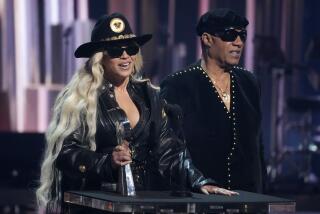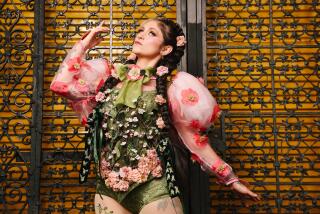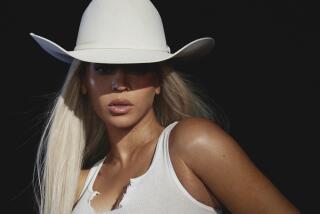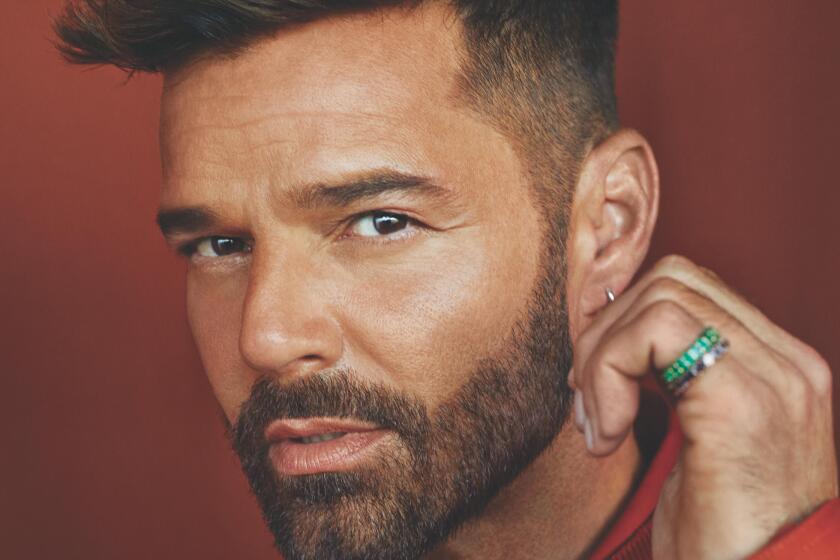How Brittany Howard got married, went solo and learned to love herself
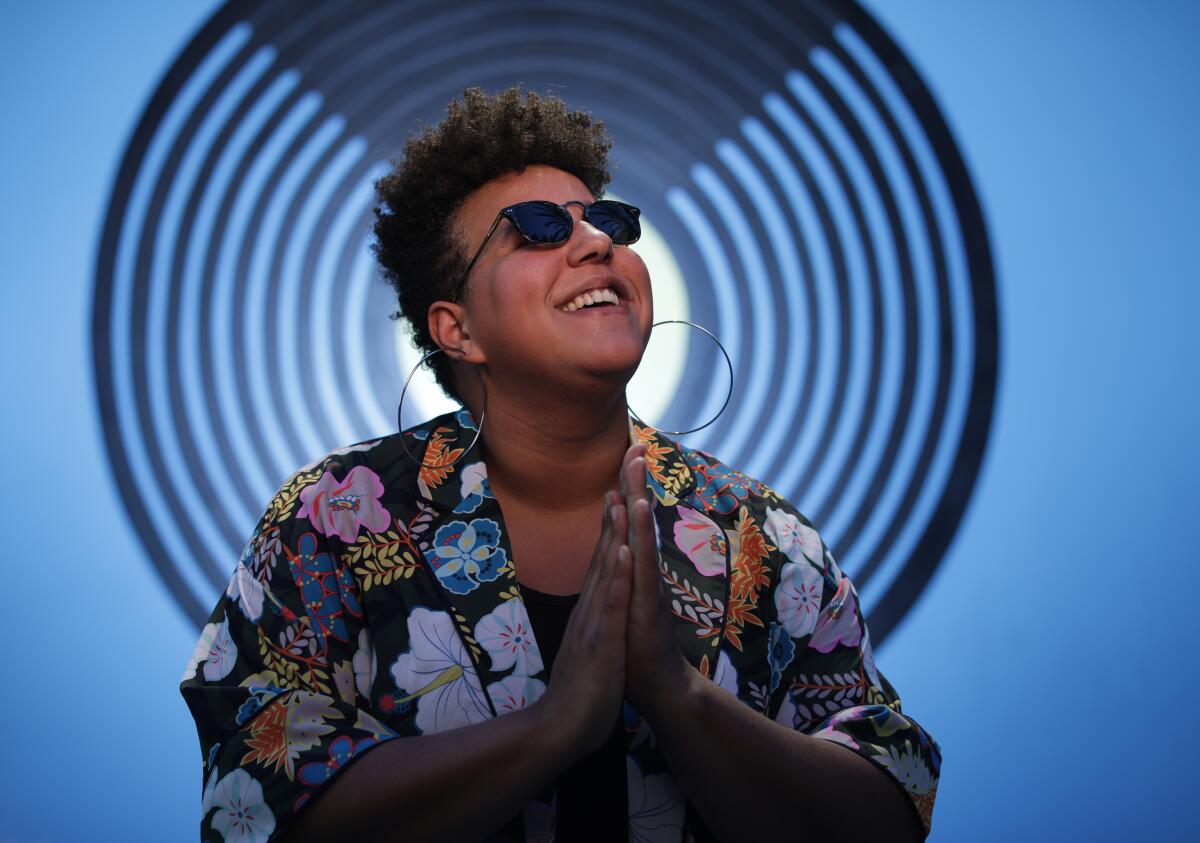
We are perched on a deck overhanging Laurel Canyon.
If this were the California of legend, you would cue the Mamas and the Papas on the soundtrack. But at the moment all one hears echoing off the hillsides is a police helicopter hanging low and a flock of crows.
Brittany Howard looks out over the canyon, singer-songwriter ground zero. “I know the scene,” she says. “But I didn’t even think about it.” Howard, 30, has left the Alabama Shakes after two great blues-drenched squalling albums to make a very of-this-moment singer-songwriter record, her way.
She and her wife, Jesse Lafser, recently moved from Nashville to small-town New Mexico, but before settling there Canyon-land had become a convenient place to hole up and take a deep look at who she was; the album she recorded here, “Jaime,” is laced with honesty, protest and self-discovery, and it careens from D’Angelo-worthy funk to noise to synth torch songs. It’s wide-open and self-contradicting, and each song feels like a stage set for a different performance.
“Jaime” is at times autobiographical, and a far more personal construction than the two albums she made fronting the Alabama Shakes. The new direction came to her, she said, “when I took some time to live my life out of music.”
Last year, Brittany and Jesse got into a 1999 Jeep Cherokee without air conditioning and saw a big swath of the country. They were scouting for a new place to live. They went to Montana, Oregon, Oklahoma, Yellowstone National Park. Some people threw firecrackers at them as they stood by the roadside, others welcomed them into an unknown bar. They saw America, 2019.
“It gives you time to reminisce and think. And the inspiration given to me was all about my own life,” she says. “I realized people had this whole idea about who I was. And they would be shocked to see I’m not this loud, confident black woman. I’m a quiet person who is observing and listening.”
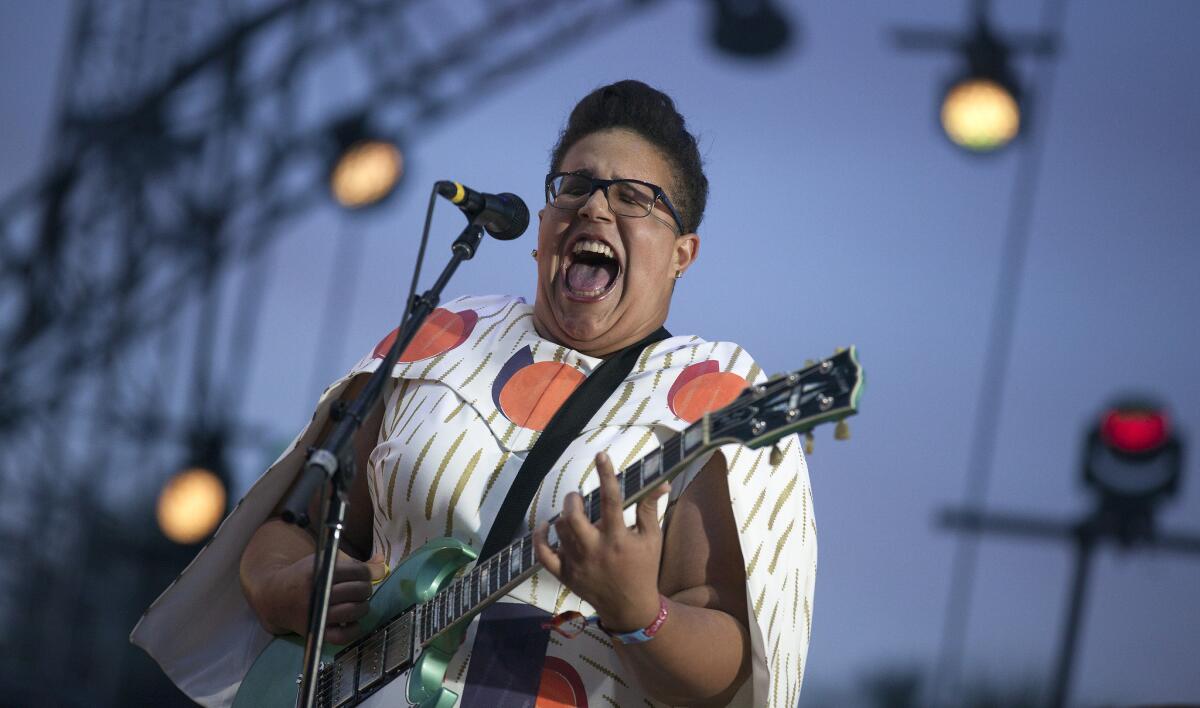
She decided she wanted to do the solo record she’d been thinking of since she was 11, sitting in her bedroom in small-town Alabama. She called up Shawn Everett — the producer, engineer and mixer who worked on the Alabama Shakes’ Grammy-winning 2015 “Sound & Color” — and they settled on recording in September 2018. Everett’s suggested deadline gave her three months to write songs. And that’s when she started to freak out, says Howard.
She thought “uh-oh,” she said, “this is real.” She had been living in Nashville for several years, and suddenly the city’s responsibilities and distractions loomed large. She drove out to Topanga Canyon, Airbnb-ing it for months on end.
“So I get up there in this gorgeous house, flowers everywhere, butterflies. Oh, and all these birds. It was so amazing, and I was so miserable. Inspiration, where is it?
“It was a beautiful place, so relaxing, but I just absolutely panicked. And it wasn’t until…” she waits for the helicopter to fade in the distance. “As soon as I quit looking, that’s when it came.”
‘She was cool, man, she was mean!’
“Jaime” was the name of Brittany’s only sibling. The sisters grew up together in a house in the woods of Athens, Ala., a village of 20,000 with a skate rink, a burger joint and a town square. Jaime, who was four years older than Brittany, died at the age of 13 of retinoblastoma, a cancer of the eye that spread to her brain. Howard sang about her on the Alabama Shakes debut, “Boys & Girls,” wailing, “Why wasn’t it me?” on “On Your Way.” The new album isn’t meant as a tribute to her sister so much as a tribute to the creativity that flowed through Jaime and which she shared with her kid sister.
“She was cool, man, she was mean!” says Howard. “Never cut her fingernails and could scratch your face.” Her sister liked to draw, and read, and sat in her room with a big box of cassette tapes.
“She would flip it open to me and say, ‘Which one do you want to listen to?’ ” says Howard. “I’d say, ‘What’s this one?’
“‘That’s the Presidents of the United States. They do this song about peaches. Do you want to hear it?’” And then that whole week they’d be singing the “Peaches” song.
Brittany took songs she’d written to her sister, and Jaime would tell her when she felt the effort was sub-par. “I was, like, 5. But I never felt disrespected, because she knows the way. She’d say, ‘You have to start with a verse, you idiot, then get to the chorus, throw the bridge in there …’ ”
The girls were raised by a black father and a white mother who are now divorced. Speaking by phone, with a rooster crowing in the background, her father, K.J. Howard, remembers what life with Brittany was like. He recalls coming home to find her driving golf balls in the living room. “Man! Keeping her, um, entertained was a job,” he says with gusto. She wanted a treehouse; K.J. built it and moved it higher when Brittany said it was too close to the ground.
One day she got an idea. “She goes in the shed and she gets oil brake fluid, then she gets chlorine tablets from the swimming pool, other stuff, mixes it all together in a container, puts a top on it. Then she says the container starts shaking and it’s just boom it explodes and the whole treehouse catches on fire.” Brittany jumped and broke her arm. Explosive creativity was coming to the surface.
Southern rock for the new South
The Alabama Shakes debuted in 2012 with a just about perfect soul-rock album that was so real it skipped past the hipsters who liked, say, Daptone releases and captured the hearts of those who liked Tom Petty. “Boys & Girls” peaked at No. 6 on the Billboard 200 chart, and the foursome — guitarist-vocalist Howard, guitarist Heath Fogg, bassist Zac Cockrell and drummer Steve Johnson —appeared on “Saturday Night Live” and rocked the White House.
Their radically more ambitious followup, “Sound & Color,” debuted at the top of the Billboard 200 and earned a Grammy nomination for album of the year (they won four Grammys, including for alternative album). The Shakes had gone from outliers to a group that made the music industry feel good about itself. They were white boys fronted by a towering, barefoot African American soul-shouting lesbian who played a noisy guitar, and if they symbolized Southern rock to many, this was the South of Stacey Abrams and the rock of Janelle Monáe. It was both reassuring and brand new.
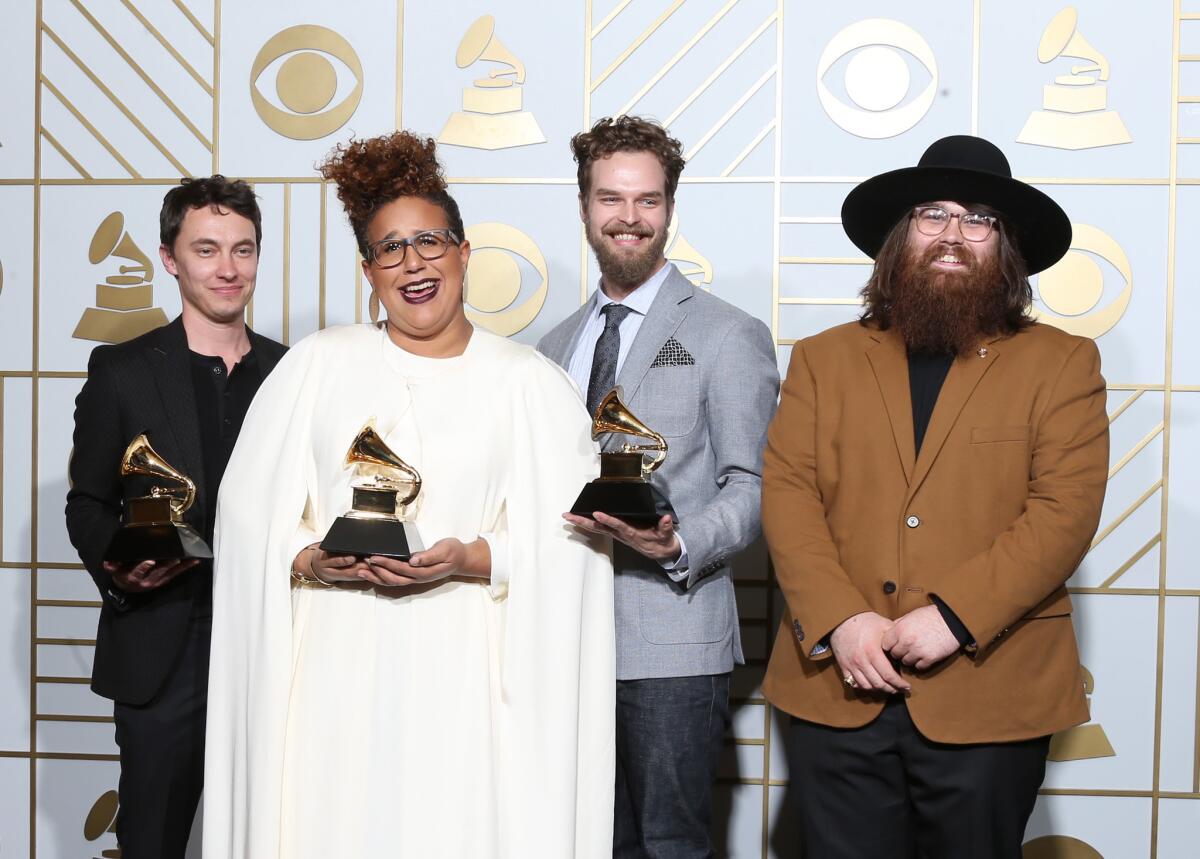
Only now, their future looks unclear. Howard recalls the painful moment when she told her band mates, in their Athens rehearsal space, that she was going out on her own. She started by saying she couldn’t write a Shakes album right now, noting that they’d been rehearsing and it didn’t feel right. And then it evolved into “asking them for the opportunity to do this,” she says. “They were confused about it at first, but the more we talked they were like, ‘I get it.’ ” By the end of the meeting, everyone agreed to leave the prospects for a future release “open-ended.”
The sound of “Jaime,” crunchy, funky and terse, is likely to unsettle some Shakes fans. There’s no sense of region, be it the South or Southern California; the music is the product of jam aesthetics that involve grooves and grit tossed around in the studio and hammered into place. Keyboardist Robert Glasper, who plays on “Jaime,” says it wouldn’t surprise him to hear criticism from certain quarters. “It’s so funny — there’s all this policing when it comes to black music. But if I’m a black musician and I decide to do a bunch of genres that my ancestors have built … the whole point is to evolve. Rock music isn’t supposed to sound like Chuck Berry nowadays.”
The songs address cultural gatekeepers, whether it’s folks who force their image of God upon others (“He Loves Me”) or those unconcerned about current affairs (“History Repeats”).
In “Georgia,” she takes the voice of a young girl trying to understand the attraction she feels to an older girl. Beneath that, Howard says, it is about understanding the many ways a person can feel different from those around her. “The feeling of having this strangeness about you,” she explains.
“Growing up it was like, ‘Oh I’m taller than most of the other girls. I’m more round than the rest of the girls.’ My whole experience was just an oddity. It’s really not that odd, but where I was growing up it was, for sure.”
And yet, even in small-town Alabama, even in the heart of Dixie, popular culture can give you images of yourself that you don’t find at school. She remembers seeing hip-hop star Missy Elliott when she was growing up, and how she had gained something she didn’t even know she was missing. “Missy’s existence? Changed everything. I’m like, that’s who I’m like. I’m like Missy Elliott. And I felt, well, I’m not bad odd, I’m different good.”
And God bless Lizzo, too, she adds. “I’m 30, and I’ve learned, like Lizzo has learned, just be cool to yourself. Don’t hate yourself because you’re not a blond-hair, blue-eyed size zero. About 10 years ago, I made the decision that I just wanted to be happy with who I am. That was the beginning of my journey with learning how to love my body. You have to find that love for yourself deep down inside, underneath all that questioning and ickiness.”
Nowadays, she says, “I’m shocked when I hear someone say something bad about my body. I’m like, ‘Whoa — you must be feeling miserable in some other place to make somebody else feel bad.’ ”

Howard is talking casually and calmly about stuff, and she’s laughing: a glorious, almost dirty laugh about how some people can be so wrong. She isn’t as mad as she is amused, and you can practically see her making notes on the world.
She said she wasn’t fully aware of her identity as a lesbian until she could detach herself from earlier images she grew up with. She was 25 or 26, and had enough perspective on Athens to see that her experience there wasn’t the complete picture. “As soon as I got out into the world and saw people who were in same-sex relationships and happy and living their life not being afraid,” that’s when her life changed.
Other songs on the album explore her past through a child’s eyes, trying to come to terms with what they see. In “Goat Head,” she refers to the time that some neighbor took offense to her parent’s interracial marriage and put the head from a slaughtered goat in the back seat of her dad’s pickup truck.
There’s a line tossed off in the song: “My heroes are black.” I ask who her heroes are. Martin Luther King Jr., Nina Simone, Muhammad Ali, Maya Angelou, James Baldwin, she says.
What do they have in common?
“Their stories are of remaining whole in a world that wants to break them into a million pieces. I relate to that,” she says. “Remain whole, remain yourself, don’t let ’em break you.”
Clearly she has given a lot of thought in the last year to who she is, and her picture of that person may be changing. But her fans feel like they already know who she is: a rock star. Does she feel like one?
Her hand slaps the tabletop.
“No! I feel like a squid. I don’t feel like a ... rock star,” she hoots. “I tried! It’s not good for you.” She looks away for a split second. And then comes that glorious lowdown laugh again, spilling into the canyon below.
More to Read
The biggest entertainment stories
Get our big stories about Hollywood, film, television, music, arts, culture and more right in your inbox as soon as they publish.
You may occasionally receive promotional content from the Los Angeles Times.
